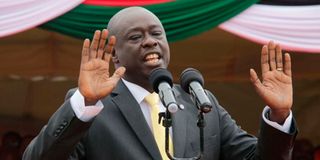We will increase forest cover threefold, Gachagua says after shamba system gaffe

Deputy president Rigathi Gachagua.
Deputy President Rigathi Gachagua has clarified his initial order on the return of the controversial system that allowed Kenyans to farm inside forests.
DP Gachagua said the plan is to allocate land within forest reserves to farmers so as to grow trees concurrently with the crops up until the level that the latter cannot continue to thrive.
According to the country's second in command, no one will be allowed in existing forests, insisting that he was misquoted on the matter, and noting that the Kenya Kwanza administration is determined to increase forest cover.
“Shamba system is not about going to the forest and doing farming. It means that you go to the forest reserves, there is land that has been set aside within the gazetted forests that has no trees at all. It is a virgin land. You give farmers land and give them seedlings and that is part of afforestation. They plant the trees and plant crops,” said Mr Gachagua in an interview with Citizen TV.
Also Read: I was misquoted on shamba system - Gachagua
He added: "They take care of the trees and when they reach like five feet, farmers get out because the crop will never grow. What I was talking about is not about invading the forest and interfering with what is happening. I was talking about increasing forest cover and increasing food production at the same time. I was talking about virgin land within the gazetted forest reserves and that is the shamba system. It has never been about getting into forest.”
He promised that President William Ruto's government is determined to ensure the country achieves the 10 percent forest cover noting that all the environmentalists will be involved to attain this goal.
Mr Gachagua said since the government has no resources to employ people who will take care of young trees planted, it would be prudent if those living around the forest are engaged to do so through shamba system.
“We are going to get into serious afforestation and even the people who are concerned about the environment, I’m going to mobilize them to assist us. We have no money to employ people to plant seedlings and take care of them. We are going to partner with farmers around the forest reserves and all areas that are reserved for forests and have no single tree. We are going to mobilise the farmers, give them the seedlings, let them plant the seedlings and take care of them," he said.
Mr Gachagua added the government is aware of the effects of climate change and how the global nightmare has to be dealt with.
“I want to give Kenyans an assurance that the Ruto administration will increase the forest cover threefold. We are serious about partnering with farmers to plant trees in areas that have no trees and trees need to be planted. That is our position,” said Mr Gachagua.
When properly practised, the shamba system moves farmers into nearby degraded forests to plant and tend to tree seedlings whilst planting their own crops among the seedlings.
However, the shamba system had come up against plenty of criticism from environmentalists, including the late Nobel Laureate Wangari Maathai, calling it destructive and responsible for making East Africa’s indigenous forests and water security vulnerable.
Started in the colonial days of 1910, the shamba system has been run under different arrangements between the government and peasant farmers. However, it used to operate under no legal frame.
The system was, however, later abused by those who grabbed public forest land.
The shamba system, also known as Pelis, was abolished during President Mwai Kibaki's regime as it was subject to abuse by some Kenya Forest Service (KFS) and millers who were also taking advantage to do logging.





